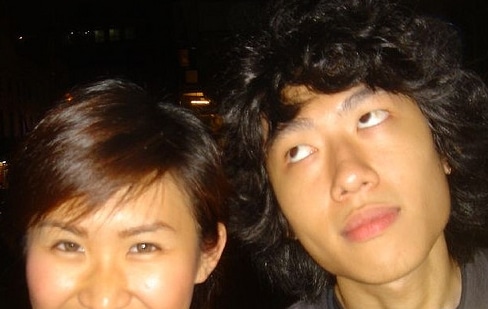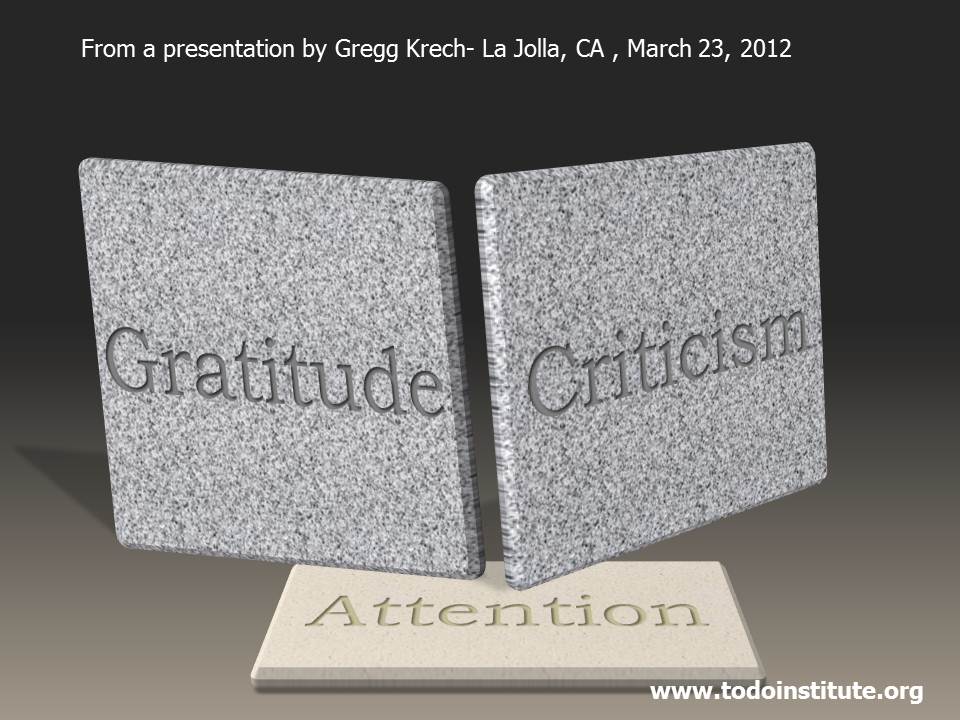I once traveled with a friend who had great insight into human nature. He said, “Wherever you go you can find something to complain about.” If we travel, we can complain about lumpy beds and crowded airports. But if we stay home, we can complain that we never go anywhere interesting and there’s never anything good on television. When I first went to Japan about twenty years ago I had a little book of phrases to help me communicate
in Japanese. I had purchased it without thoroughly examining it, but when I was in Japan I read it carefully. I was amazed at how many phrases were designed to help the traveler complain about something. In the “hotel” section of the book, about one third of the phrases showed you how to complain about some problem at a hotel (“The air conditioner in my room does not work properly.”) Yet in that same section, there wasn’t even one phrase that helped you express appreciation (“Thank you for cleaning the room while I was out.”) The authors of the book apparently assumed that English speaking people in Japan have a great need to complain.
In Japanese language there is a term — On. The meaning of on often includes a sense of gratitude combined with a desire to repay others for what we have been given. It’s not just that we feel grateful, or that we express our gratitude, but that we actually experience a sincere desire to give something back. We might think of it as appreciation that stimulates a sense of obligation. Not an externally imposed obligation. But a sense of obligation that arises naturally within us as we recognize how we have been supported and cared for by others.
So how do we go from a complaining life to one which cultivates, and is grounded in, a spirit of on – a spirit of Thanksgiving? The first thing we must do is become aware of how much we complain and how complaining creates suffering for ourselves and those around us. We can develop such an awareness by doing an exercise called “not complaining” for one day. In this exercise you simply try not to express any type of complaint for a whole day. You don’t complain about the traffic or your mother. You don’t complain about the weather or your work. You don’t even complain about not being able to complain. If you try this, you may find that you periodically fail and let a complaint slip through your lips. If that happens, just acknowledge the slip-up and return to the exercise. Even if you refrain from complaining speech, you may realize that you do a lot of complaining in your head.
Once you’ve completed this exercise, spend about 30 minutes reflecting on what it’s like for others to listen to your complaints. We generally don’t think about the other person’s experience when we are in the midst of complaining, because the act of complaining is one in which our attention is very self-focused. So consider your phone calls, and meals with friends and family. Consider evening conversation with your spouse. Imagine what it is like for others to listen to your complaints. I recently had a conversation with my daughter about how unpleasant it is to listen to her argue with her sister. The next day she happened to be nearby when my wife and I argued and confessed to me, “Now I know what you mean.”
But to refrain from complaining is not the same thing as being grateful. It simply opens up some space for us to shift our attention. We can begin to notice all the aspects of our existence that we have taken for granted. Toasters that make toast.
Light bulbs that make it possible to read at night. Hot water for showers. Eyeglasses that take defective eyes and make them see almost perfectly. The world supports us in infinite ways and it often does such a good job that we don’t pay much attention.
Someone once told me a story of a young boy who didn’t speak. His parents were very concerned and had him examined by medical doctors and psychiatrists, but they could find nothing wrong. Then one morning, when he was about five years old, his mother served him some toast for breakfast that was slightly burnt. He looked at the toast and said, “This toast is burnt.” His mother was thrilled that he had finally spoken. After her initial excitement, she asked him why he hadn’t spoken up until now. And he said, “Up until now, everything was OK.” That’s pretty much how our mind works.
When everything is OK we don’t pay much attention to it. So our challenge is to start paying attention to what is OK. If you do this, you may begin to have brief moments of appreciation, of feeling grateful for how your life is supported, moment by moment.
I should warn you that you will lose much of the so-called “drama” of your life when you notice what is OK instead of complaining. And you will lose the sympathy of others that is sometimes (not as often as you’d like, of course) stimulated by your complaints.
Nobody has sympathy for you because your car started this morning. And it’s not particularly dramatic to tell the story of how tirelessly your furnace worked on a chilly evening and how a nice pair of wool socks kept your feet warm. Some of us don’t want to give up the drama and sympathy of talking about how difficult our lives are. We like the spotlight to shine on our suffering. We know that everyone is suffering, but we want to advance the claim that our suffering is somehow special, somehow different.
The best way I know to learn to shift your attention is to begin a daily practice of quiet self-reflection called Naikan, originally developed in Japan. Naikan suggests that you reflect on the day using three simple questions:
- What have I received from others today?
- What have I given to others today?
- What difficulties have I caused others today?
You simply spend about twenty five minutes before bedtime and write down detailed answers to these three questions. If you do this, even for 3-4 nights in a row, you may start to notice a change in your perspective, a greater awareness of how your life is supported by others and what impact you are having on the world around you. But over time, you will also notice that what you notice is changing. Your attention will momentarily shift and you will begin to notice things in a different way. It may not be dramatic at first – perhaps the awareness of the person bagging your groceries in the checkout line. But it will be, well . . . noticeable.
Stages of Gratitude
I have identified seven stages of gratitude:
#1 Even though I am supported and cared for by others, I have no awareness of it and I spend most of the time complaining.
#2 I am somewhat aware of the care and support I receive, but I feel I deserve it and spend much of the time complaining.
#3 When something unexpected is done for me or given to me I am grateful, but I take most things for granted and complain quite a bit
#4 I am frequently aware of how fortunate I am but I feel I’ve worked very hard to get here and do a lot for others. I consistently complain when things don’t go my way
#5 I am aware, almost daily, of how I am consistently supported by others and that I don’t give back nearly as much as I receive. I know I shouldn’t complain, but I do anyway.
#6 I am aware on a daily basis of how much I receive from others and how little I give back in return. I have a growing awareness of my tendency to be focused on myself as well as a sense of the problems and difficulties I consistently cause others. I feel both grateful and guilty. Given this, I’m amazed that I still complain so much.
#7 I’m aware each day of how much I receive from others and how little I give. I make an effort to give more to others as a result. My life is blessed and I clearly don’t deserve what I have. Whatever I have accomplished was only done with the support of others. When I forget all this, I still complain.
Being Grateful for Problems
It can be a challenge to move from a life of complaining to a life of Thanksgiving. But it is even more challenging to appreciate the problems we encounter in our lives. If someone gives us a new car for our birthday, gratitude may come easily. But if a tree limb falls on that car, how can we be grateful for that?
Sometimes, when we look back at the problems we’ve had, we find that they were seeds for what later emerged as blessings in our lives. For example, perhaps you were in a very serious relationship with someone when you were younger, but the relationship ended and you were devastated. Years later you fell in love with someone else and married and now you have a family that includes two wonderful children. So the heartbreaking end of one relationship was an important step in creating the birth of your children. This is something we don’t usually realize unless we take time to reflect on our past. But when we do reflect, we may see that at least some of the problems or crises of our past were blessings in disguise. Faith, to some extent, is the ability to see this while we are in the midst of the “problem” rather than realizing it twenty years later.
But I don’t want to suggest that all our suffering can be characterized this way. Because even such a realization leaves us with a very limited, and rather self-centered view of the universe. That view might be stated as follows:
“If my life unfolds in a way that makes me happy, then I am grateful. But if it doesn’t unfold according to my ideas and desires, then I am not grateful.”
I think there is an experience of gratitude that goes beyond such a view, and it is the experience of gratitude for life itself. One is not grateful just because one receives a new DVD player or is cured from a serious illness. One is grateful for life — for the experience of being part of a universe in which the spirit of life occupies us and allows us to live. From this viewpoint, we are grateful for our difficulties as well, because our difficulties remind us of the great blessing of life and the universe that lives through us.
Even as our life comes to a close we are grateful for having lived, for having been given the opportunity to experience this extraordinary world of ours.
From this viewpoint, I am grateful for an argument with my wife because I recognize that it is only because I am blessed with life and speech and hearing and a wife that I can have an argument at all.
As you can see there is a progression in each of these stages towards greater awareness of how we are supported. Towards greater awareness of our own self-centeredness.
Towards a view of life based on grace rather than on what we deserve. And, finally, towards a desire, even a need, to give something back. And somehow, miraculously, as my friend said, there is always something we can complain about.
There are other stages beyond these. They touch on issues such as faith, surrender, self- acceptance and the dissolution of the idea that we are separate from others. I must admit that my own path is a bit of a roller coaster. I may wake up in the morning with a very profound sense of gratitude and grace and the effortlessness of each task. And by the afternoon I am pretty much struggling in Stage 1 as if my feet were stuck in concrete, complaining about being too busy and my kids bickering and my computer not functioning the way it’s supposed to.
But Naikan, as a tool for reflection, always invites me back to the reality of my life — a life more characterized by grace, gratitude, humility and a natural desire to repay the world for all that it’s given me. Not just for DVD players and automobiles, but for the privilege of participating in life itself, of being blessed to experience the universe through my senses, through this struggling, aging body. The privilege of watching my daughter laugh, tasting a pea, or even getting stuck in traffic. What a ride this is. Some mysterious force hoists me up to heaven for a moment, and then I fall right on my face with no recollection of where I’ve been. Until I’m unexpectedly reminded.
Responding to the World’s Gloom
These aren’t easy times for the world. But that’s always been true. The gloom of past decades or centuries seems less threatening now because, with hindsight, we know the world survived. But now we’re not sure the world, in its current predicament will actually survive.
Some people try to maintain a positive outlook by simply ignoring the suffering in the world, but I don’t think this is the best strategy. If your child was lying next to you with a serious illness, would you just ignore her so you wouldn’t be so upset? This is our world and we must accept that it is full of suffering. We must be willing to see that suffering and acknowledge its presence.
But suffering is not all there is. Here at the ToDo Institute, after morning meditation, we always read a passage from the Rules of St. Benedict that includes:
Life will always provide matters for concern. Each day, however, brings with it reasons for joy.1
I love this passage because it reminds us that both suffering and joy coexist in the world. If we act as if there is only suffering, then we act on a mistaken view of the world. I think the Dalai Lama manifests this beautifully when he pulls peoples’ beards. He seems to enjoy doing this as a kind of practical joke and then he’ll sometimes follow it with a mischievous giggle. Here’s a man who is living in exile and his country is under occupation by the Chinese, yet somehow he has the capacity to be playful and joyful in the most childlike way. If we can set aside our gloom and somehow notice what there is to be joyful about, we not only change our personal experience of life but we change the world by bringing more joy into it.
Of course another way to respond to the suffering in the world is to do something about it. Albert Schweitzer offers us inspiration when he writes, “However much concerned I was at the problem of misery in the world, I never let myself get lost in broodings over it. I always held firmly to the thought that each one of us can do a little to bring some portion of it to an end.”
So we can do our share to relieve suffering. And we can bring a bit more joy to others by complaining less and expressing our gratitude more often. And we can create more space in our lives for self-reflection – space to recognize the grace of this mysterious force that keeps our hearts beating. And space to reflect on how we are living and what impact we are having on those around us. These are simple ideas and yet they present us with monumental challenges.
Thanksgiving season is a wonderful time of year to put these ideas into practice. So is New Year’s . . . or your birthday. What are we waiting for? There’s always something to complain about. Or here’s another perspective:
Thanks to all those who support my existence, so I am able to complain.
Gregg Krech is the author of five books including Naikan: Gratitude, Grace and the Japanese Art of SelfReflection (Stone Bridge Press) which won Spirituality & Health Magazine’s award for Best Spiritual Books of 2002. His work has been featured on public radio and in magazines such as Utne Reader, Tricycle, The SUN, Counseling Today and SELF. He is the Director of the ToDo Institute near Middlebury, Vermont – a nonprofit educational center for methods of Japanese Psychology – where he conducts retreats, certification programs and distance learning courses.
1 Actually this is from an interpretation of St. Benedicts Rules called, Always We Begin Again by John McQuiston II (Morehouse Publishing) .
© 2005, 2018 by Gregg Krech. All Rights Reserved.
Tags: gratitude holidays Mindfulness Thirty Thousand Days















